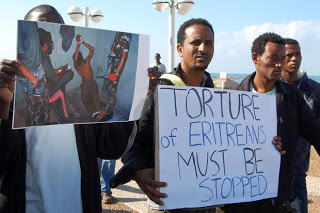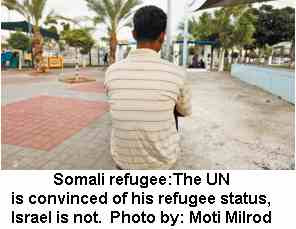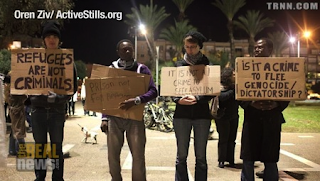Israel may be many things, but it isn’t a slouch when it comes to jailing refugees and asyum seekers. As Netanyahu made clear some time ago, Zionism doesn’t allow refugees to stay in Israel because they are not Jewish and would ‘dilute’ the racial purity of Israel if allowed to stay. Israel has enough ‘demographic problems’ without refugees adding to them.
We see here that Zionism and Israel are the antithesis of what is understood to be Jewish values. Jews fled persecution in many countries and sought refuge in other countries. How ironic that the most hostile country today to refugees (and it is quite a competition) is the Jewish state of Israel.
Tony Greenstein
On January 11th the Israeli parliament passed an amendment to the so- called “Infiltrators Law”. This revision allows the authorities to automatically imprison asylum seekers for three years. The plan includes constructing a 10,000 person jail to house the refugees. According to Amnesty International, this puts Israel at the top of the Western World for length of imprisonment of refugees. Today Israel is home to nearly 50,000 asylum seekers from Africa, 85% of whom are from Eritrea and Sudan. The Real News’ Lia Tarachansky spoke to Nic Schlagman and Johannes Bayu of the African Refugee Development Center, Ran Cohen of Physicians for Human Rights, and “Ibrahim”, an Eritrean asylum seeker in Israel for ten years.
p.s. and for a little laugh…
“I was born at the same time as the Occupation and have been living under its inherent inhumanity, inequality, racism and lack of freedom ever since. Suffering and oppression did not fill my heart with hatred for anyone, nor did they kindle feelings of revenge. To the contrary, they reinforced my belief in peace and national standing as an adequate response to the inhumanity of Occupation… The military prosecutor accuses me of inciting the protesters to throw stones at the soldiers. This is not true. What incites protesters to throw stones is the sound of bullets, the Occupation’s bulldozers as they destroy the land, the smell of teargas and the smoke coming from burnt houses.” Bassem Tamimi of Nabi Saleh, from Israeli Jail, Arrested March 24, 2011
A new law passed by the Knesset Monday night will make Israel the developed country that detains illegal immigrants without trial for the longest period, according to data collected by Amnesty International’s Israel office.
The law allows people who enter Israel illegally to be incarcerated for up to three years.
Somali refugee – Moti Milrod – October 2011
Amnesty’s data also shows that no other country in the world has a detention center of the size Israel plans to build to enforce the law: It will have room for 10,000 inmates.
“When you compare the Israeli law to laws in Western countries, you can see that three years is extraordinary,” said Sara Robinson, refugee rights coordinator for Amnesty International Israel. “Even when you look at the situation in countries where the law does not put a limit on detention for asylum-seekers, you can see that in fact, the average detention is shorter than in Israel.”
Under current law, which will remain in force until the newly-passed law to prevent illegal entry takes effect, a person who enters Israel illegally and cannot be deported under international law may be held in detention for up to 60 days.
The Amnesty International comparison paper notes that in June 2008, all European Union countries except Britain and Ireland ratified an ordinance that limits the detention of illegal immigrants to six months, which can be extended to 18 months under special circumstances.
Even in Britain, which refused to approve the ordinance and does not define a maximum detention term for illegal immigrants, figures from 2009 and 2010 show that people who entered the country illegally were detained for no more than six months.
Incarceration is also relatively short in other countries that do not have legally mandated restrictions on detention. For example, in the United States, the average time an illegal immigrant spent behind bars in 2009 was 114 days, while in Canada, it was four months. In Australia, studies show that 62 percent of illegal immigrants are incarcerated for less than 12 months.
France, Italy and Spain, which face large numbers of illegal immigrants, detain asylum-seekers for shorter periods, limited by law to 32, 60 and 180 days, respectively.
Amnesty’s figures also show that the detention center Israel is planning to build in the south will be the largest in the world. The largest such facility currently is Willacy Detention Center in Raymondville, Texas, which can house up to 3,086 detainees.
“The construction of a giant detention center in Israel, with a maximum capacity of 10,000, is exceptional in terms of size, scope and price and is disproportionate to the situation in Israel,” one Amnesty official said.
Even in countries that are coping with illegal immigration on a much larger scale than what Israel faces, huge detention centers are not considered the solution. In Canada, which is now hosting over 200,000 refugees and asylum-seekers and gets between 35,000 to 120,000 illegal immigrants every year, the largest such detention center can house 272 people.
France, where the largest detention center can accommodate 270 people, operates open housing for asylum-seekers that provides food and other basic services. France has 269 such residential sites in which some 14,000 people currently live.
Detention centers in Italy, whose treatment of illegal immigrants is considered harsh, have a maximum capacity of 6,771 people combined, and the largest such facility houses 875 people. Italy also operates open residential sites, where a total of 3,146 illegal immigrants are housed.
Robinson’s comparative study also found that while the Prison Service operates Israel’s detention center, this is not the case in other countries. “The Prison Service is not trained to deal with immigrants and asylum seekers,” she said. “Israel’s decision to have the Prison Service operate the detention center places it alongside undeveloped countries with regard to the detention of immigrants.”
In France, Robinson found, the open residential units are operated by various social service groups. In Italy, asylum-seekers are housed through government agencies, social service and religious groups or other nonprofit associations.
The Electronic Intifada
Tel Aviv 5 December 2011
TEL AVIV (IPS) – Standing across the street from the US embassy in Tel Aviv, more than 200 Eritrean asylum seekers chanted “Yes to justice! Yes to humanity!” and demanded international intervention to stop torture camps in the Egyptian Sinai. Protests by African asylum seekers in Israel are growing, in the face of increasingly tough policies by the Israeli authorities.
“We’re here to stop this torture and to call the world to be aware of this,” said Habtom Mehari, a 30-year-old Eritrean asylum seeker, at the rally on 25 November.
“I came through Sinai [in Egypt] and when I was coming four years ago, and it was not as problematic as it is now. Now it is a criminal organization that puts people in a camp. It’s a very, very bad experience,” Mehari said.
But after an arduous journey through Sinai — where reports of violence, rape and torture at the hands of local traffickers are widespread — African refugees and asylum seekers are finding that their challenges continue once in Israel.
“I don’t believe that refugees are saved here in Israel. There are refugees here without any status, without any shelter,” said Haile Mengistaab, chairman of the Eritrean Community Committee in Israel, one of the largest groups among the estimated 27,000 refugees and asylum seekers living in Israel.
“Their lives are in danger. Starting from Eritrea to here in Israel, life remains precarious,” Mengistaab, who came to Israel a year ago, said.
On 14 November, the Committee on Internal Affairs in Israel’s parliament, the Knesset, discussed an amendment to the country’s “Prevention of Infiltration” law. The amendment would bring in a minimum three-year prison term for asylum seekers and their children, and a five-year prison term for those who offer humanitarian aid to refugees.
The declared purpose of the amendment is to deter asylum seekers from entering Israel. The committee is expected to discuss it further on 5 December before passing it on to a vote in the full Knesset.
Massive detention center
“If you’re from a hostile place, like Darfur, you could be imprisoned indefinitely,” Sara Robinson, refugee rights coordinator of Amnesty International’s Israel section said. “This infiltration law has to be thought of as a package with the government decision to build a 10,000-bed detention center in the south.”
In November 2010, the Israeli government approved a plan to build a massive detention center in the Negev/Naqab desert, to hold thousands of asylum seekers and their families before deportation. Israeli Prime Minister Benjamin Netanyahu said at the time: “We must stop the mass entry of illegal migrant workers because of the very serious threat to the character and future to the state of Israel.”
At the cost of 1.35 billion Israeli shekels ($400 million), Israel is also currently constructing a fence along its border with Egypt, to keep African migrants out.
According to Robinson, Israel has to date recognized less than 200 asylum seekers as refugees, and has not formulated a clear refugee status determination policy, despite the fact that it is a signatory to the United Nations’ 1951 Convention relating to the Status of Refugees.
International obligations
“They’re trying to find ad hoc solutions and a deterrence policy, and that’s not a refugee policy that respects human rights. They need to enact the 1951 Convention into domestic law,” Robinson said.
“Israel needs to be following its international obligations which includes a fair, transparent refugee status determination system. Follow the law. We don’t have to re-invent the law; we just have to enact the legislation that exists and follow it,” she said.
According to Haile Mengistaab, the Israeli government must take its responsibility to protect Eritrean refugees and asylum seekers, not threaten them with imprisonment, since they have risked everything to flee dictatorship in Eritrea.
“This [new amendment] is illegal, irresponsible and unjust. We condemn the Israeli government for the detention of innocent refugees that claim asylum, and we are demanding the government of Israel amend their policy and give status to the refugees,” Mengistaab said.
“We are not infiltrators. We are here to get asylum, so there is no need to stigmatize us. We are refugees. We have been recognized as refugees in Europe, but here in Israel, [we have] zero status. Why? We are just demanding protection.”


